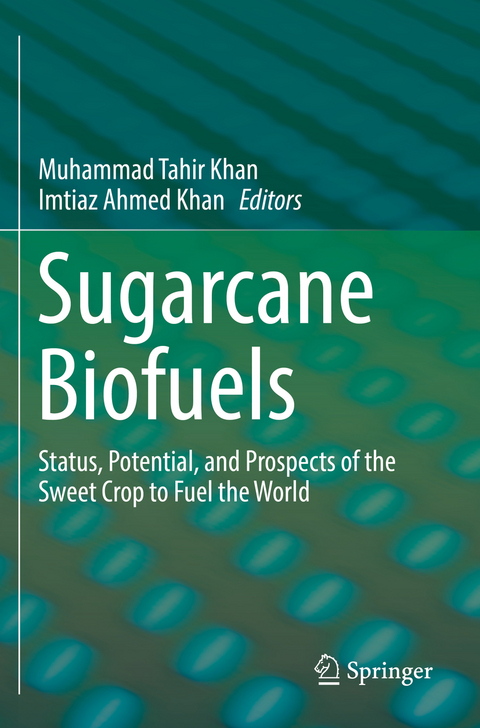
Sugarcane Biofuels
Springer International Publishing (Verlag)
978-3-030-18599-2 (ISBN)
Sugarcane exhibits all the major characteristics of a promising bioenergy crop including high biomass yield, C4 photosynthetic system, perennial nature, and ratooning ability. Being the largest agricultural commodity of the world with respect to total production, sugarcane biomass is abundantly available. Brazil has already become a sugarcane biofuels centered economy while Thailand, Colombia, and South Africa are also significantly exploiting this energy source. Other major cane producers include India, China, Pakistan, Mexico, Australia, Indonesia, and the United States. It has been projected that sugarcane biofuels will be playing extremely important role in world's energy matrix in recent future.
This book analyzes the significance, applications, achievements, and future avenues of biofuels and bioenergy production from sugarcane, in top cane growing countries around the globe. Moreover, we also evaluate the barriers and areas of improvement for targeting efficient, sustainable, and cost-effective biofuels from sugarcane to meet the world's energy needs and combat the climate change.
lt;p>Muhammad Tahir Khan is serving as a scientist at Nuclear Institute of Agriculture, Tandojam, Pakistan. His group focuses on sugarcane breeding, targeting higher sucrose levels and biomass. He has extensively published regarding sugarcane improvement through biotechnology, and its importance as a sugar and energy source. He is author of many international and national publications, review articles and book chapters. His research also focusses on markers assisted selection of promising crop genotype. His major achievements include efficient molecular based screening procedures for various diseases of sugarcane, and reliable tissue culture protocols for in vitro mutagenesis at his institute. Earlier, He gained training from National Institute for Biotechnology and Genetic Engineering (NIBGE), a top-notch molecular biology institute of the country. He has also worked on various research projects at Saint Cloud State University, MN, USA. Moreover, he also won a grant for short term stay at a German research institute, in Jena.
Dr. Imtiaz Ahmed Khan has 30 years of research experience on sugarcane. He is currently serving as Deputy Chief Scientist at Nuclear Institute of Agriculture, Tandojam, Pakistan. He also serves as the member of Board of Governors of University of Science and Technology, Abbottabad. Moreover, he is working as resource person for Institute of Biotechnology and Genetic Engineering, University of Sindh, Jamshoro and Centre for Molecular Genetics, Karachi University. His research interests include sugarcane breeding, induced somatic mutations, and molecular markers studies. Previously, he has been trained at University of Katowice, Poland, and CIRAD, France. He has already published more than 100 articles, four book chapters, and one book. His work has been highly cited by national and international authors. He has also presented his work in more than 50 national and international conferences. He also serves as member of the Editorial Board of International Journal of Biology and Biotechnology and Pakistan Journal of Biotechnology, moreover, he is a referee of Pakistan Journal of Botany for the field of Tissue culture, Biotechnology and Genetics. He has been awarded gold medals by Pakistan Society of Sugar Technologist (PSST) in 2013 and 2018 and he is also recipient of Research Productivity Award from ministry of Science and Technology, Pakistan.
1. Sugarcane as a Bioenergy Source.- 2. Biofuels Production from Sugarcane - Various Routes of Harvesting Energy from the Crop.- 3. Energy Cane: A Sound Alternative of a Bioenergy Crop for Tropics and Subtropics.- 4. Genetically Modified Sugarcane for Biofuels Production: Status and Perspectives of Conventional Transgenic Approaches, RNA Interference and Genome Editing for Improving Sugarcane for Biofuels.- 5. Biofuels Production from Sugarcane in Brazil.- 6. Sugarcane Production and It's Utilization as a Biofuel in India: Status, Perspectives, and Current Policy.- 7. Sugarcane biofuels production in China.- 8. Biofuels Production from Sugarcane in Thailand.- 9. Sugarcane Biofuels and Bioenergy Production in Pakistan: Current Scenario, Potential, and Future Avenues.- 10. Ethanol Production from the Mexican Sugar Industry: Perspectives and Challenges.- 11. Sugarcane Biofuels Production in Colombia.- 12. Environmental, Economic and Social Impacts of Biofuels Production from Sugarcanein Australia.- 13. Sugarcane Biofuels Production in Indonesia.- 14. Sugarcane Biofuel Production in the USA.- 15. Sugarcane Biofuels Production in South Africa, Guatemala, Philippines, Argentina, Vietnam, Cuba, and Sri Lanka.- 16. Source-Sink Relationship of Sugarcane Energy Production at the Sugar Mills.- 17. Challenges, Constraints, and Limitations of Cane Biofuels.- 18. Sustainability and Environmental Impacts of Sugarcane Biofuels.- 19. Future Perspectives of Sugarcane Biofuels.- Index.
| Erscheinungsdatum | 24.07.2020 |
|---|---|
| Zusatzinfo | IX, 472 p. 119 illus., 99 illus. in color. |
| Verlagsort | Cham |
| Sprache | englisch |
| Maße | 155 x 235 mm |
| Gewicht | 735 g |
| Themenwelt | Naturwissenschaften ► Biologie ► Botanik |
| Schlagworte | bioenergy • Bioenergy Crop • Bioethanol • biofuel • C4 photosynthesis • Cellulosic Biofuel • Environmental impact • Green Energy • Sugarcane • sustainability |
| ISBN-10 | 3-030-18599-0 / 3030185990 |
| ISBN-13 | 978-3-030-18599-2 / 9783030185992 |
| Zustand | Neuware |
| Haben Sie eine Frage zum Produkt? |
aus dem Bereich


